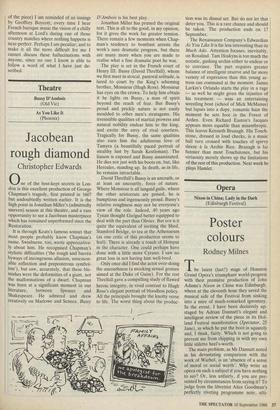Theatre
Bussy D'Ambois (Old Vic) As You Like It (Phoenix)
Jacobean rough diamond
Christopher Edwards
0 ne of the best-kept secrets in Lon- don is this excellent production of George Chapman's tragedy, first printed in 1607 but undoubtedly written earlier. It is the high point in Jonathan Miller's (admittedly uneven) season at this theatre, and a rare opportunity to see a Jacobean masterpiece which has remained unperformed since the Restoration.
It is through Keats's famous sonnet that most people probably know Chapman's name. Swinburne, too, wrote appreciative- ly about him. He recognised Chapman's stylistic difficulties ('the rough and barren byways of incongruous allusion, unseason- able reflection and preposterous symbol- ism'), but saw, accurately, that these ble- mishes were the deformities of a giant, not the malformations of a dwarf. Chapman was born at a significant moment in our literature, between Spenser and Shakespeare. He admired and drew creatively on Marlowe and Seneca. Bussy D'Ambois is his best play.
Jonathan Miller has pruned the original text. This is all to the good, in my opinion, for it gives the work far greater tension. There remain a few moments when Chap- man's tendency to bombast arrests the work's sure dramatic progress, but there are many more when you are made to realise what a fine dramatic poet he was.
The play is set in the French court of Henry III. Bussy (David Threlfall), whom we first meet in stoical, pastoral solitude, is lured to court by the King's scheming brother, Monsieur (Hugh Ross). Monsieur has eyes on the crown. To help him obtain it he lights on Bussy, a man of spirit beyond the reach of fear. But Bussy's proud and prickly nature is not easily moulded to other men's stratagems. His irresistible qualities of martial prowess and natural nobility endear him to the king, and excite the envy of rival courtiers. Tragically for Bussy, the same qualities also earn him the adulterous love of Tamyra (a beautifully paced portrait of stealthy lust by Sarah Kestleman). The liaison is exposed and Bussy assassinated. He dies not just with his boots on, but, like Hercules, standing up. In death, as in life, he remains intractable.
David Threlfall's Bussy is an uncouth, or at least an uncourtly, force of nature. Where Monsieur is all languid guile, where the other aristocrats are poised, he is bumptious and ingenuously proud. Bussy's relative roughness may not be everyone's view of the role. Indeed, 40 years ago Tynan thought Gielgud better equipped to deal with the part than Olivier. But nor is it quite the equivalent of inviting the Shed, Stamford Bridge, to tea at the Athenaeum (as one critic of this production seems to feel). There is already a touch of Hotspur in the character. One could perhaps have done with a little more Cyrano. I saw no great loss in not having him well-bred.
Only once did I find the actor over-doing the uncouthness (a mocking sexual gesture aimed at the Duke of Guise). For the rest Threlfall gave a compelling study of flawed heroic integrity, in vivid contrast to Hugh Ross's elegant portrait of bloodless policy. All the principals brought the knotty verse to life. The worst thing about the produc- tion was its dismal set. But do not let that deter you. This is a rare chance and should be taken. The production ends on 17 September.
The Renaissance Company's Edwardian As You Like It is far less interesting than its Much Ado. Attention focuses, inevitably, on Rosalind. Tam Hoskyns is too much the ecstatic, gushing urchin either to endear or to convince. The part requires greater balance of intelligent reserve and far more variety of expression than this young ac- tress can command at the moment. James Larkin's Orlando starts the play in a rage -- as well he might given the injustice of his treatment — wins an entertaining wrestling bout (school of Mick McManus) but lapses into a dopy, romantic haze the moment he sets foot in the Forest of Arden. Even Richard Easton's Jacques appears more equable than misanthropic. This leaves Kenneth Branagh. His Touch- stone, dressed in loud checks, is a music hall turn crossed with touches of spivvy sleeze a la Archie Rice. Branagh is far funnier than most Touchstones, but his virtuosity merely shows up the limitations of the rest of this production. Next week he plays Hamlet.






















































 Previous page
Previous page